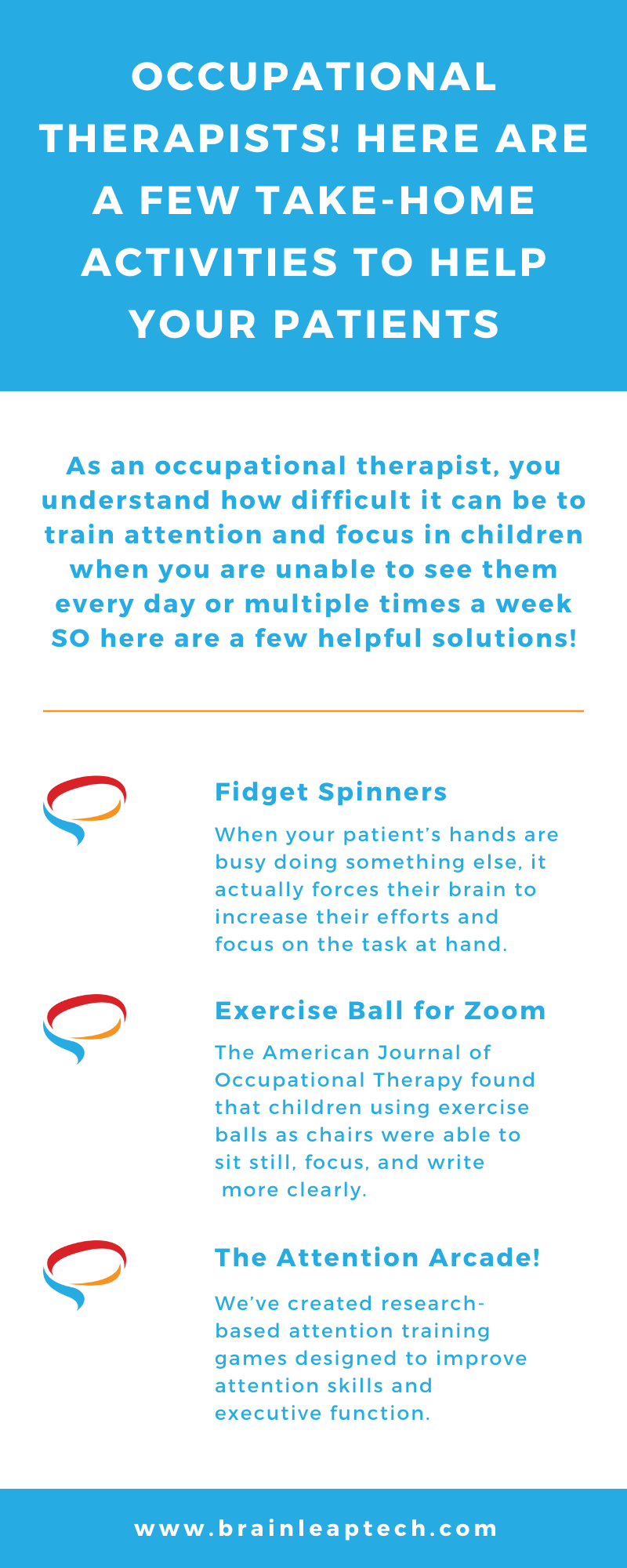Get Updates, Tips and Insights
Articles, stories and advice for parents and educators of kids who could use a little help paying attention.
LINKS
CONTACT INFO
HOURS
Mon – Fri: 8:00AM – 6:00PM
Sat – Sun: Closed
As an occupational therapist, you understand how difficult it can be to train attention and focus in children when you are unable to see them every day or multiple times a week. When you send your patients home, you need to be confident that they are practicing recommended therapies at home. As you know, practicing these activities is like practicing a sport, or practicing the piano.
At BrainLeap we understand the need to practice beyond your in-office occupational therapy programs, so we’ve created a list of learning activities your patients can take beyond the appointment.
Sensory processing toys, like fidget spinners, help improve focus on the task at hand. When your patient’s hands are busy doing something else, it actually forces your brain to increase your efforts and focus on the task at hand. Fidget spinners help kids put their excess energy into something focused, so they can pay attention to the task at hand.
With the growth of online learning, it can be difficult for teachers to manage a classroom remotely. The American Journal of Occupational Therapy performed a study on exercise balls and their ability to improve behavior and productivity. In this study, they found that children using exercise balls as chairs were able to sit still, focus, and write words more clearly.

Diana Henry, a traveling occupational therapist states “generally speaking, people don’t sit still. They are always wiggling around. The littlest kids are even more wiggly because their sensory systems are still developing.”
She goes on to state that “movement actually allows for alertness and attention.” So, while you may think the exercise balls are distracting your child, they’re actually helping them focus more!
At BrainLeap we’ve created a practical, research-based attention training designed to improve attention and executive function. We work to unlock the potential of a child by working to improve foundational attention skills that are important for reading, math, and executive functioning.
Dr. Leanne Chukoskie and Dr. Jeanne Townsend, at UC San Diego, recognized the need to turn research findings into effective interventions for children with attention issues. Their understanding of attention development and the eye movement system has contributed to their innovative idea of creating gaze-driven video games that deliver measurable attention improvements.
Some of the children even wanted to keep the games after the 12-week study because they actually found the games fun! After the study, it was clear that this product could help millions of children improve the skills they needed to do well in school and in life.
Our mission is to unlock the potential of more than one million children with attention challenges around the world – every year. However, we recognized that we could do this best with partners who are already helping children: Occupational Therapists. Whether you are helping children via a private practice or in schools, you understand the needs of these children and the tools that could help. Implementing the evidence-based Attention Arcade into your occupational therapy practice can change your patients’ outcomes.
To better meet the needs of OTs, we recently upgraded our software to allow occupational therapists to track the performance of their patients remotely.
Articles, stories and advice for parents and educators of kids who could use a little help paying attention.
Mon – Fri: 8:00AM – 6:00PM
Sat – Sun: Closed

 Improving Attention Can Strengthen Reading Skills
Improving Attention Can Strengthen Reading Skills